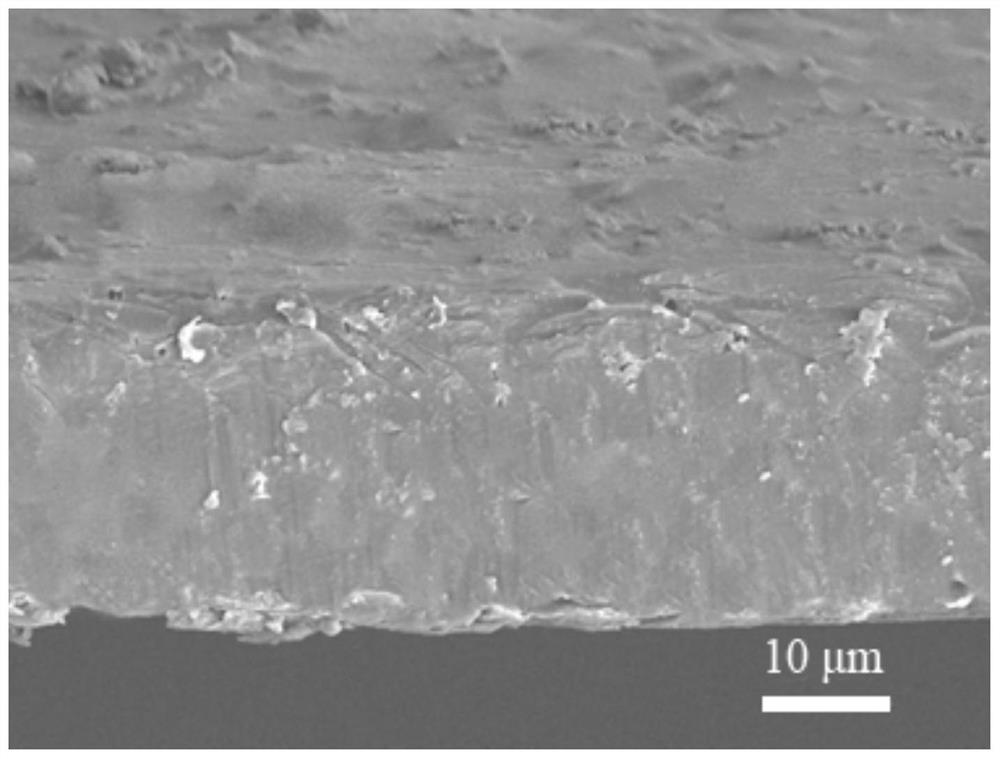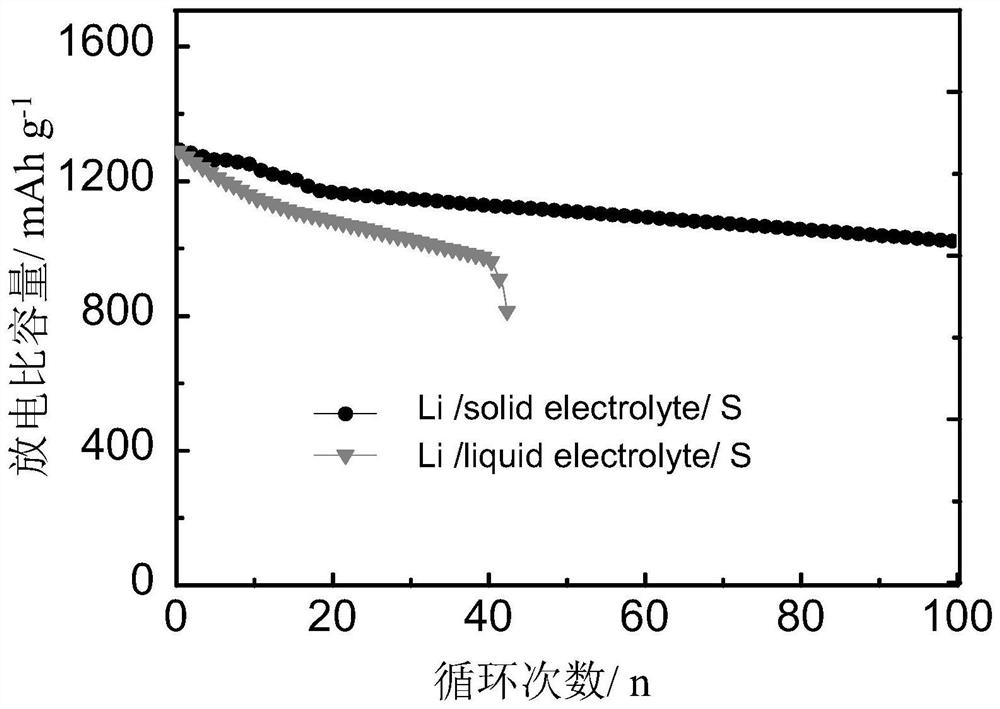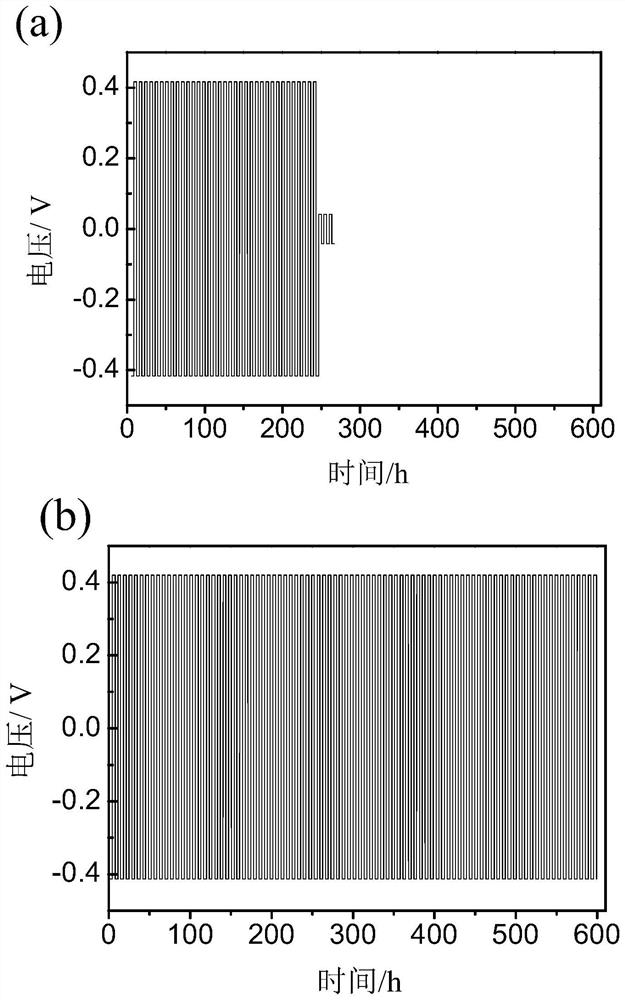Double-layer solid electrolyte composite membrane with polyacrylonitrile as the main body, its preparation method and application
A solid electrolyte, polyacrylonitrile technology, applied in solid electrolyte, electrolyte battery manufacturing, non-aqueous electrolyte and other directions, can solve the problems of low electrical conductivity and poor mechanical properties
- Summary
- Abstract
- Description
- Claims
- Application Information
AI Technical Summary
Problems solved by technology
Method used
Image
Examples
Embodiment 1
[0041] 1) Dissolve PAN, PEO and LATP in DMF in a certain proportion, and magnetically stir to form a homogeneous solution. The mass ratio of PAN to PEO is 1:1, and LATP is 10% of the sum of the mass of PAN and PEO;
[0042] 2) Apply the homogeneous solution obtained in step 1) on a glass plate with a scraper, and dry it at 60°C for 10 minutes to obtain the first layer of electrolyte, which is named PPL electrolyte layer;
[0043] 3) Dissolve PAN and LATP in DMF in a certain proportion, and magnetically stir to form a homogeneous solution. The LATP is 10% of the mass of PAN; the resulting solution is scraped and coated on the PPL electrolyte layer obtained in step 2) with a scraper to obtain a PL electrolyte layer;
[0044] 4) Put the double-layer electrolyte obtained in step 3) in a vacuum drying oven at 60°C for 12 hours in a vacuum to obtain a double-layer solid electrolyte composite membrane (ie, a double-layer solid electrolyte composite membrane mainly composed of polyacr...
Embodiment 2
[0050] 1) Dissolve PAN, PEO and LATP in DMF in a certain proportion, and magnetically stir to form a homogeneous solution. The ratio of PAN to PEO mass is 1:1, and LATP is 20% of the sum of PAN and PEO mass;
[0051] 2) Apply the solution obtained in step 1) on a glass plate with a scraper, and dry at 60°C for 10 minutes to obtain the first layer of PPL electrolyte;
[0052] 3) Dissolve PAN and LATP in DMF in a certain proportion, and magnetically stir to form a homogeneous solution. The LATP is 20% of the mass of PAN; the solution obtained above is scraped and coated on the PPL electrolyte layer obtained in step 2) with a scraper to obtain the PL electrolyte layer;
[0053] 4) The double-layer electrolyte obtained in step 3) was vacuum-dried in a vacuum oven at 60° C. for 12 hours to obtain a composite film of double-layer solid electrolyte, called PPL-PL. The thickness of this electrolyte is 25 μm±1.
[0054] 5) The gel polymer electrolyte material is punched into a disc ...
Embodiment 3
[0057] 1) Dissolve PAN, PEO and LATP in DMF in a certain proportion, and magnetically stir to form a homogeneous solution. The ratio of PAN to PEO mass is 1:1, and LATP is 30% of the sum of PAN and PEO mass;
[0058] 2) Apply the solution obtained in step 1) on a glass plate with a scraper, and dry at 60°C for 10 minutes to obtain the first layer of PPL electrolyte;
[0059] 3) Dissolve PAN and LATP in DMF in a certain proportion, and magnetically stir to form a homogeneous solution. The LATP is 30% of the mass of PAN; the solution obtained above is scraped and coated on the PPL electrolyte layer obtained in step 2) with a scraper to obtain the PL electrolyte layer;
[0060] 4) The double-layer electrolyte obtained in step 3) was vacuum-dried in a vacuum oven at 60° C. for 12 hours to obtain a composite film of double-layer solid electrolyte, called PPL-PL. The thickness of this electrolyte is 25 μm±1.
[0061] 5) The gel polymer electrolyte material is punched into a disc ...
PUM
| Property | Measurement | Unit |
|---|---|---|
| thickness | aaaaa | aaaaa |
| retention rate | aaaaa | aaaaa |
| retention rate | aaaaa | aaaaa |
Abstract
Description
Claims
Application Information
 Login to View More
Login to View More - R&D
- Intellectual Property
- Life Sciences
- Materials
- Tech Scout
- Unparalleled Data Quality
- Higher Quality Content
- 60% Fewer Hallucinations
Browse by: Latest US Patents, China's latest patents, Technical Efficacy Thesaurus, Application Domain, Technology Topic, Popular Technical Reports.
© 2025 PatSnap. All rights reserved.Legal|Privacy policy|Modern Slavery Act Transparency Statement|Sitemap|About US| Contact US: help@patsnap.com



